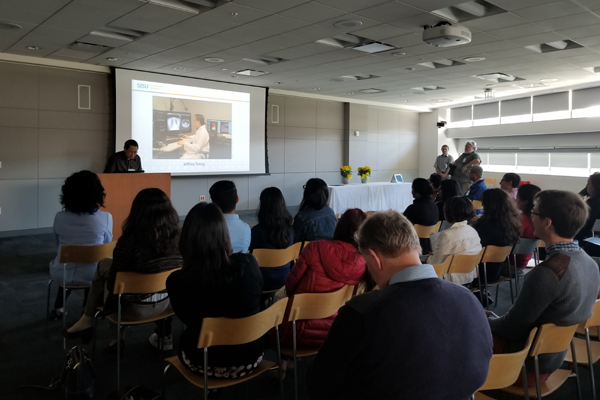
Jeffrey Tseng, an economics graduate student, shared a summary of his research into selecting radiology students. (Photo: Melissa Anderson)
By David Goll
With projects ranging from the creation of a snakebite anti-venom to a study of the impacts of gentrification on LGBTQ seniors, 10 San Jose State University students are taking their work on to a statewide contest against their California State University peers. The students who worked as individuals or as teams on the eight winning projects of SJSU’s Student Research Competition were honored at the 39th Annual Student Research Forum April 17, where they shared presentations and posters about their work. They will be competing in the 32nd Annual California State University Student Research Competition May 4 and 5 in Sacramento.
The SJSU projects will be among more than 200 projects from throughout the 23-campus CSU system with first and second place winners selected in 10 categories.
“I am amazed every year at the diversity of projects in our campus competition,” said Gilles Muller, SJSU associate dean of research.
He’s been involved in the student research event as the associate dean, a judge, or as a faculty member of the Department of Chemistry for more than 10 years.
“I really enjoy it and frequently learn about topics I know little about. It inspires me to research more about these subjects.”
In the SJSU competition, students were judged on a variety of criteria including appropriateness of methodology, interpretation of results, oral presentation and ability to answer questions from judges and audience members. Chemical engineering graduate student Israel Juarez Contreras will be taking his “Expression of Snake Anti-venom Peptide Chain in PichiaPastoris” research project to the competition.
His research yielded a finding that a protein present in opossums can neutralize toxic components in snake venom and can be economically stored and grown in methylotrophic yeast, making it a considerably cheaper option than available anti-venom drugs. He started his research nearly two years ago. Contreras said this would be particularly valuable in places like India and nations in sub-Saharan Africa, where anti-venom drugs are expensive and less available than in the United States. He said a research collaborator in India told him his discovery could reduce anti-venom costs to $1 or $2 per dose. One recent news article places the current price at $7 or more a dose. According to the World Health Organization, 500,000 people either die or suffer permanent disability from snake bites annually worldwide, Contreras said.
“When I got here (to San Jose State), I realized how awesome the resources are here,” Contreras told a gathering of fellow winners, faculty mentors and others at the 39th Annual Student Research Forum April 17 in the Dr. Martin Luther King, Jr. Library. “That includes a great faculty. I realized I had much greater opportunity to do research here than at a UC (University of California) school.”
Another student researcher also hopes to have an impact on medical treatment. Potential beneficiaries of research by Vandana Kannan, a computer science graduate student from India, could be young children and the elderly. Kannan said her “Text-to-Image Synthesis” project examines how to create software to convert written text into images, making it easier for medical professionals to explain treatment options. She proposes using machine-learning algorithms to retrieve images from online repositories and genetic algorithms to create a collage of retrieved images.
Simon Jarrar was also considering his elders in his research into “Lost Legacies: An Evaluation of the Impact of Gentrification on LGBTQ Elderly Communities in the Bay Area.”
Jarrar, a graduate student in applied anthropology who is from Orange County, said the Bay Area’s astronomical cost of housing has an impact on most of its residents.
“But usually you hear about its effects on young people,” he said.
Jarrar decided to examine how older lesbian and gay residents from San Francisco, the East Bay and San Jose have fared during the high tech-induced high prices of the 21st century. He interviewed several people to determine if their social networks, community and political connections and living situations have been affected by gentrification. He also asked what strategies they employ to “age in place” in one of the nation’s priciest real estate markets.
Other winning projects moving on to CSU competition include:
- Kelly Cricchio, art and art history: “Invisible Women: The Casa dell Zitelle and Female Patronage in Early Modern Venice.”
- Vijay Lalith Cuppala, mechanical engineering: “An Investigation into the Deformation Properties of Clamped Concrete Filled Steel Tubes.”
- Revathy Devaraj, Qi Li and Unnikrishnan Sreekumar, computer engineering and software engineering: “Real-time Traffic Pattern Collection and Analysis Model.”
- Khiem Pham, computer science: “An Approximate Algorithm for Spectral Clustering Based on the Bipartite Graph Model.”
- Jeffrey Tseng, economics: “Radiology Resident Selection and Performance Prediction: Can We Do Better?”